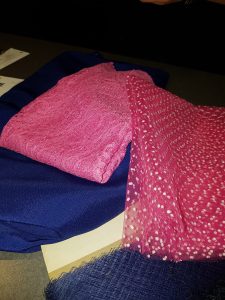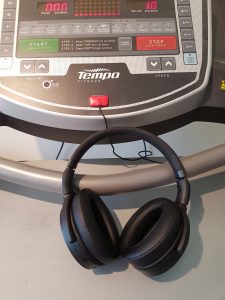 For the most part, I’m fairly disciplined with respect to my writing. It’s my day job; I show up at the same time five mornings a week and I write. I got into the habit when my kids were young and I’ve kept it up. If I’m on deadline, that writing often spills into the afternoons. If I’m not on deadline and providing I’ve already written a decent number of pages, then I’ll sometimes switch gears in the afternoon and do an editing job or research, respond to emails, or deal with any current business issues.
For the most part, I’m fairly disciplined with respect to my writing. It’s my day job; I show up at the same time five mornings a week and I write. I got into the habit when my kids were young and I’ve kept it up. If I’m on deadline, that writing often spills into the afternoons. If I’m not on deadline and providing I’ve already written a decent number of pages, then I’ll sometimes switch gears in the afternoon and do an editing job or research, respond to emails, or deal with any current business issues.
Not deviating and staying consistent with my routine keeps me productive and on track, and that makes me happy. Lately, however, my routine has been torpedoed.
If I’m being completely honest, things began going south in January, when we moved. At first it was the upheaval of relocating to a different town: unpacking, getting my office set up, all of that. Then I realized I was missing my morning gym workout, something I routinely did (and had done for decades) before sitting down to write. Cycling or running was out of the question; the weather wasn’t conducive. Since we’re not living in the community we intend to settle in permanently, I needed an affordable short-term workout location. It took me another week of checking out nearby facilities before I figured out which one would work best for me.
I was poised to sign a short-term contract – and excited about finally getting back into a regular routine – when my father fell and ended up in hospital. He lives half way across the country, by himself, with no family nearby. Someone had to be there for him and I was it. My one week there turned into two, and I returned home with the full responsibility of his affairs, both medical and personal.
He’s still in hospital, still working towards some kind of recovery, and facing an uncertain future. That’s his reality and it’s not a pleasant one. My reality, aside from the personal heartbreak of witnessing his decline (and that’s no small thing), is that there’s a two-hour time difference between the west coast and Manitoba. That means when my phone starts ringing at 8 am, it’s already 10 o’clock there and the middle of the morning. Calls to doctors or social workers don’t happen on my timetable; they happen on theirs. Water pipes don’t freeze at a time that’s convenient; they freeze when they freeze (which is usually overnight, only to be discovered first thing in the morning).
My priorities have shifted in an unexpected and unwelcome way.
Kristine Kathryn Rusch has a great blog post this week about priorities. https://kriswrites.com/2019/02/27/business-musings-priorities/
The timing of her post was serendipitous for me. She talks about how there are times when we all have to give up something on our priorities list. She stresses the importance of acceptance in the face of doing that.
My mornings are not always my own right now, and no amount of wishing or discipline will change that. I don’t like it but I’m learning to accept it. Afternoons, never my freshest time, are quieter. So, I’m writing then. Wish me luck.
 A few weeks ago, I attended a weekend workshop. It had nothing to do with writing; it was about soul growth and reincarnation for those of us ‘woo’ types who believe in that sort of thing. In spite of the focus, writing was never far from my mind. That’s partly because I’m writing a book with a past life theme, but also because of a comment made by the facilitator.
A few weeks ago, I attended a weekend workshop. It had nothing to do with writing; it was about soul growth and reincarnation for those of us ‘woo’ types who believe in that sort of thing. In spite of the focus, writing was never far from my mind. That’s partly because I’m writing a book with a past life theme, but also because of a comment made by the facilitator. It’s a new year, a new windowsill, and a new stack of books. We’ve unpacked and settled in, at least for the short term, to our temporary cottage with a view. It’s quiet here, and much more off the beaten track than I’m used to. Someone asked me the other day if the setting is inspiring my writing. I can’t say it is yet. We’ve only been here a few weeks, we’ve had days of heavy fog and my office is in a nearly windowless back room. I’m optimistic, however, that once I remember to crawl out of my cave occasionally and enjoy the stunning view, my writing will benefit. In the meantime, because I’m not popping out in the evening like I did when I lived in the city, I have more time to read.
It’s a new year, a new windowsill, and a new stack of books. We’ve unpacked and settled in, at least for the short term, to our temporary cottage with a view. It’s quiet here, and much more off the beaten track than I’m used to. Someone asked me the other day if the setting is inspiring my writing. I can’t say it is yet. We’ve only been here a few weeks, we’ve had days of heavy fog and my office is in a nearly windowless back room. I’m optimistic, however, that once I remember to crawl out of my cave occasionally and enjoy the stunning view, my writing will benefit. In the meantime, because I’m not popping out in the evening like I did when I lived in the city, I have more time to read. Our lunch was winding down but our beginning writer friend had several more questions. What, she asked, is the one habit that most effectively supports your writing career?
Our lunch was winding down but our beginning writer friend had several more questions. What, she asked, is the one habit that most effectively supports your writing career? Not long ago, I was asked by a woman just starting out on her writing journey if I’d be willing to answer a few general questions about the industry, and some specific questions about my path to publishing. Our conversation really made me think. Over the next few weeks I’ll bring you some of her questions and my answers, along with answers from other authors as well.
Not long ago, I was asked by a woman just starting out on her writing journey if I’d be willing to answer a few general questions about the industry, and some specific questions about my path to publishing. Our conversation really made me think. Over the next few weeks I’ll bring you some of her questions and my answers, along with answers from other authors as well. Some days chickens, other days feathers. When the feathers are flying and the chickens are in short supply – in other words when life isn’t unfolding according to plan, escaping into a good book can be a godsend. And that’s exactly what I’ve been doing lately. Here’s what I’m reading this month.
Some days chickens, other days feathers. When the feathers are flying and the chickens are in short supply – in other words when life isn’t unfolding according to plan, escaping into a good book can be a godsend. And that’s exactly what I’ve been doing lately. Here’s what I’m reading this month. For some, the mere mention of the word fitness sends us into, well, fits. One friend of mine is convinced fitness is the ultimate F word. She’s a nurse with a job that keeps her active and on her feet, but that’s not the case for us writers. Writing is, by nature, a sedentary activity and so are many writing-related activities. Things like reading, research, and interviewing people for background information are almost always done sitting down.
For some, the mere mention of the word fitness sends us into, well, fits. One friend of mine is convinced fitness is the ultimate F word. She’s a nurse with a job that keeps her active and on her feet, but that’s not the case for us writers. Writing is, by nature, a sedentary activity and so are many writing-related activities. Things like reading, research, and interviewing people for background information are almost always done sitting down. Writing books and making hats have something in common. Who knew? I certainly didn’t when I commissioned Lynda Marie
Writing books and making hats have something in common. Who knew? I certainly didn’t when I commissioned Lynda Marie 
 The key word of this summer is noise. Noise from the neighbor’s chain saw as he removed the old pear trees bordering our properties (sob!); noise from the gut and rebuild taking place around the corner from us (the jackhammers are back for the second week); noise from a neighbor on the other side bulldozing part of his lawn and hauling in loads of gravel so he can park more cars.
The key word of this summer is noise. Noise from the neighbor’s chain saw as he removed the old pear trees bordering our properties (sob!); noise from the gut and rebuild taking place around the corner from us (the jackhammers are back for the second week); noise from a neighbor on the other side bulldozing part of his lawn and hauling in loads of gravel so he can park more cars.

Comments